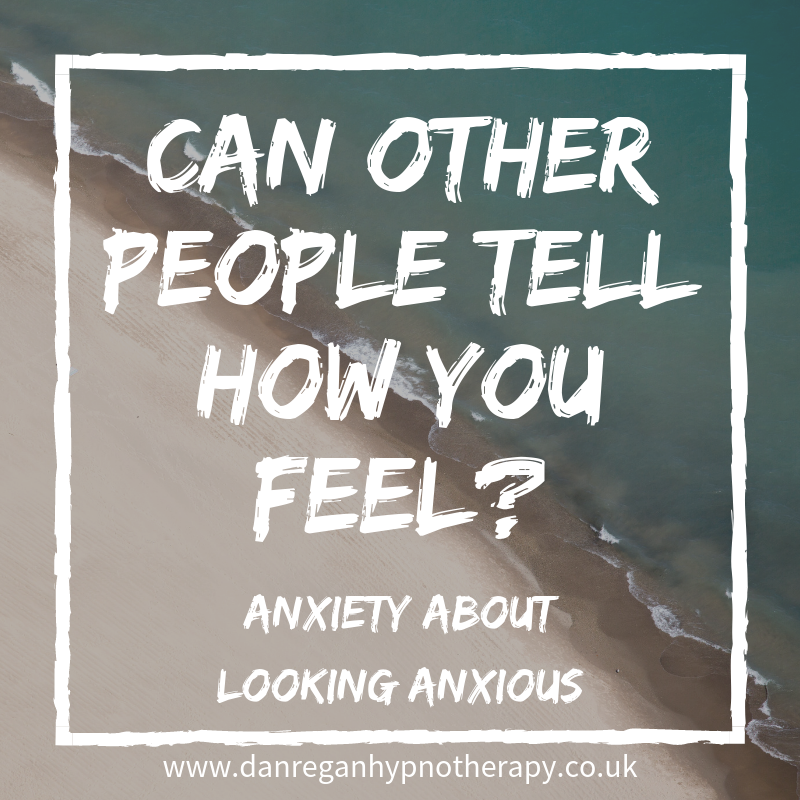Can Other People Tell How You Feel? Anxiety About Looking Anxious
One thing that people with anxiety often worry about is that other people will be able to tell that they are anxious and nervous. Those emotions are so strong inside you that you presume they will spill out of you and be noticed by other people.
That concern over other people seeing you are anxious can exacerbate your anxiety and make you feel even worse. You start to worry about looking anxious and worry about looking worried.
But is that belief actually true in reality? You may feel strong anxiety internally yet do other people notice this to the extent that you think they will? Can other people tell how you feel?
That’s what this article is about today. Can other people tell how you feel? Do you really need to feel anxious about looking anxious?
In my last article I wrote all about what’s known as the ‘spotlight effect’ whereby people overestimate the extent to which their actions and external appearance are noted by other people (have a read here: Why You Should Probably Worry Less About What Other People Think About You – The Research on Fear of Failure and Being Judged).
All the research I mention in that article points to a tendency to believe our actions and appearance stand out in the eyes of others, both positively and negatively, more than they actually do. And whilst we all know that other people don’t have as much focus on us as we have on ourselves, we still overestimate the extent to which others are attentive to our actions and appearance. That (misplaced and exaggerated) worry about what others think, the fear of failure and the fear of being judged can lead to not taking opportunities and limiting ourselves.
Rather than external actions and appearance, here we are looking at the extent to which others can tell how we feel internally and whether our thoughts, feelings and sensations ‘leak out’ and are available to others.
Can Other People Tell How You Feel?
Often we want to keep private and conceal our internal states and how we feel on the inside. We’d rather people didn’t know if we were anxious or nervous about something, whether that’s talking to someone, saying something in a meeting or delivering a presentation. You probably don’t want anyone to know about your anxiety.
It’s quite a common thing with things like anxiety, social anxiety and with low self-esteem. You don’t want others to pick up on how you are feeling anxious and you try to conceal it. You may even worry in anticipation of one of these things because you don’t want them to judge you or be aware of your own perceived vulnerability. You may worry that if they pick up on your anxiety then they will judge you negatively in some way or that you won’t be able to cope if your anxious thoughts, feelings and sensations become obvious and observable.
And (spoiler alert!), just like with the spotlight effect, the research shows that we also have a tendency to overestimate the extent to which others can discern our internal states, something known as the ‘illusion of transparency’. People often mistakenly believe that their internal states ‘leak out’ more than they really do.
One area that has been researched is with regard to public speaking anxiety, where you are nervous about delivering the speech and believe that your nervousness is more apparent to your audience than it actually is.
Interestingly enough, I came across a real life example of this recently when I attended my daughter’s primary school graduation (at the end of her time at primary school and before moving to starting college). I really enjoyed listening to all the children in her class say a few words about their time at the school, the friends and memories they had made, and what they were looking forward to in the next stage of their education.
My daughter was up last and, having sat through thirty odd of her class mates with a big smile on her face, stood up and did me proud with how well she delivered her speech. I just about held it together as she talked about her time at the school.
Afterwards all the kids and parents headed outside for a few photos and here we are on that lovely sunny day:
As I was telling her how well I thought she had done with her speech, I was almost surprised when she asked if I could tell how nervous she had been and whether I had seen that her hands had been shaking while she was up there. Which I hadn’t. Throughout her talk there didn’t seem to be the slightest suggestion of being over nervous or anxious. I thought she’d done a great, confident job!
Here was a perfect example of the illusion of transparency, whereby she assumed her nervous thoughts, feelings and sensations were more apparent to others than was actually the case.
The Illusion Of Transparency
So the illusion of transparency then is the tendency for people to overestimate the extent to which others can discern their internal states. We overestimate the extent to which out thoughts, feelings and sensations ‘leak out’ and are available to others.
In their research, Gilovich, Savitsky and Medvec (The illusion of transparency: biased assessments of others’ ability to read one’s emotional states, 1998) evidence that we make this thinking overestimation because we are quite aware of our own internal states and tend to focus on them intently when they are strong. Although we know that other people aren’t privy to the same individual information as we are, and we try to adjust for this when considering another person’s perspective, that adjustment tends to be insufficient. We are really aware of how we are feeling and it’s hard to then get beyond our own strong emotions (that we will be really focused on) to assess what others might be perceiving.
If you are experiencing very strong anxiety, for example, it can seem overwhelming and you are very focused on your own anxious thoughts and feelings to such an extent that you think others around you must be picking up on your anxiety. Even though you know that they don’t know all the anxious thoughts and feelings you have from your perspective, you still overestimate how much of your anxiety is evident to them. You think that they are more aware of what you are feeling than is likely to be the case.
In their research, Gilovich et al found that participants induced to lie overestimated the detectability of their lies by others. Their lie telling was not as obvious to others as they thought. They assumed that the fact they were not telling the truth ‘leaked out’ to others more than it actually did.
In a second study, participants were asked to taste a foul tasting drink while keeping a neutral expression felt that their feelings of disgust left tell tale traces and then overestimated the number of observers who could identify their disgust. They felt that cues to their disgust over the drink had leaked out and were noticed more by others than was actually the case. People were better at concealing their internal states that they suspected.
And in a further set of studies they demonstrated that participants confronted with a potential emergency situation believed that their feelings of concern were more observable than they actually were. Once again, they overestimated the extent to which their feelings of concern and alarm were apparent to others (thus in an emergency, someone thinks they are demonstrating more concern and alarm than is observable to others and as others do the same (and so appear calmer), they may conclude that everyone else is calm and it is not an emergency after all. They fail to recognise that how they look is the same as how everyone else looks).
“It thus appears that the illusion of transparency is a robust phenomenon that applies to a host of different internal states…When individuals attempt to determine how apparent their internal states are to others, they begin the process of judegment from their own subjective experience. The adjustments they make from this anchor–adjustments that stem from the recognition that others are not as privy to their internal states as they are themselves–tend to be insufficient…and a feeling that one’s internal states are more apparent to others than is actually the case” (Gilovich et al).
So, with intensely experienced internal states, you will have a tendency to overestimate how much of what you are experiencing can be picked up and discerned by others.
And so with anxiety, where you may worry that other people will pick up on how anxious you are. In such cases the likelihood is that you will overestimate how much of your anxiety will be apparent to others. And of course that worry about others noticing you are anxious just exacerbates your feelings of anxiety and makes you worry even more. Whilst the above research didn’t specifically look at anxiety, the principles will still apply. And, we do in fact have some research that looked into the illusion of transparency with an area of life that can induce high levels of anxiety, that is, public speaking.
Public Speaking Anxiety
So we know that people often believe their internal states are more apparent to others than is actually the case. And people who are nervous about public speaking often believe their anxiety is more apparent to their audience than it actually is.
In their research, Savitsky and Gilovich (The illusion of transparency and the alleviation of speech anxiety, 2003) looked at the role of the illusion of transparency in exacerbating nature of speech anxiety and how knowing about this illusion impacts on a speaker’s performance.
Many people experience public speaking anxiety and can be filled with worry beforehand, as well as during the speech, about things going wrong or being judged. They may feel hot, tense, shaky and so forth as the adrenaline flows and their heart pounds.
There is the fear that those anxious sensations and signs, such as shaking, that they are so very aware of themselves will be apparent to others, adding to their anxiety levels.
“An individual who experiences some anxiety while giving a speech may believe it is more apparent to the audience than is actually the case. This thought—that the audience is aware of just how nervous he or she feels—may ironically serve to make the speaker all the more nervous. The speaker may then believe that this newfound nervousness is itself apparent to others, leading to still more nervousness, concerns about leakage, and so on” (Savitsky & Gilovich).
In one study involving public speaking, participants rated themselves as having appeared more nervous than they were rated by an observer. They overestimated the extent to which their nervousness was apparent to others.
In a second public speaking study, one group of speakers were told about the illusion of transparency and how although they may be nervous, the evidence shows that other people won’t pick up on that as much as they may tend to expect so that if they did become nervous, they would probably be the only one to know about it. The results showed that this group evaluated their speeches more positively and expected observers to evaluate their speeches more positively. These benefits also carried over to the evaluation of their speeches by observers who rated them as appearing more composed and as having delivered better speeches (than those who weren’t told about the illusion of transparency).
“These results demonstrate that speakers informed about the illusion of transparency evaluate their speeches more positively, and expect observers to evaluate their speeches more positively (and them as more relaxed), than speakers not so informed. Moreover, the benefits of being informed about the illusion of transparency carry over to the actual evaluations of their speeches by impartial observers. Informed speakers were seen as more composed by observers, and their speeches were evaluated more positively, than those not informed of the illusion” (Savitsky & Gilovich).
Speakers who knew about the illusion of transparency were freed from anxiety about their nervousness being apparent to observers, allowing them to be better speakers.
In many ways, public speaking puts you into the spotlight because people are directing their attention towards you. Yet the evidence shows that you will not appear as anxious as you think you do. The same considerations will apply to other anxiety situations such as social events or approaching someone to start a conversation. In such situations, because your anxiety is so strong you may believe that your emotions leak out and are more transparent than they actually are. What you are experiencing so strongly inside doesn’t get picked up in the way you may have assumed.
When combined with the evidence about how our external actions and behaviours are noted far less than we expect, this evidence about the same effect for internal states means that you can relax much more in social situations. All the things you feel and do, and how you look, are being noticed to a much lesser extent than you may have previously believed. And if other people aren’t noticing these things then you can get out there and take opportunities, take a chance and be yourself, without those old concerns that these things are very apparent to others.
“In general, then, we suggest that any time people are nervous over the very prospect of appearing nervous, the illusion that they are more transparent than they actually are can add fuel to the fires of their anxiety. An appreciation of the illusion of transparency may help to dampen the flames” (Savitsky & Gilovich).
To your success,
Dan Regan
Hypnotherapy in Ely & Newmarket
More articles, research and advice about anxiety are available here: Anxiety Articles
Seeking help to overcome your anxiety? Book your Complimentary Hypnotherapy Strategy Session with Dan now: Appointments
Find out what other people have said after their hypnotherapy sessions with Dan: What People Say
And check out these powerful hypnosis downloads that can start helping you right away: Hypnosis Downloads
References:
Savitsky, K. and Gilovich, T., 2003. The illusion of transparency and the alleviation of speech anxiety. Journal of experimental social psychology, 39(6), pp.618-625.
Gilovich, T., Savitsky, K. and Medvec, V.H., 1998. The illusion of transparency: biased assessments of others’ ability to read one’s emotional states. Journal of personality and social psychology, 75(2), p.332.
Gilovich, T., Medvec, V.H. and Savitsky, K., 2000. The spotlight effect in social judgment: An egocentric bias in estimates of the salience of one’s own actions and appearance. Journal of personality and social psychology, 78(2), p.211.






0 Comments